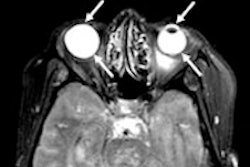
Researchers from the California Institute of Technology have developed "erasable" MRI contrast agents that blink off in response to ultrasound pulses, making it easier to read the scans, according to a study published in the May issue of Nature Materials.
Contrast agents make MRI exams easier to read by attaching to organs and tissues as markers. But they can also be difficult to distinguish from MRI signals given off by the body, wrote a team led by George Lu, PhD.
 "Erasable" MRI contrast agents can blink off on command with ultrasound technology. Credit: Barth van Rossum, PhD.
"Erasable" MRI contrast agents can blink off on command with ultrasound technology. Credit: Barth van Rossum, PhD."Clearly visualizing MRI contrast agents is a longtime, lingering problem in the field," Lu said in a statement released by the institute. "With our new study, we are showing how it could be possible to erase the contrast agent, making it much easier to read MRI scans properly."
The technology uses nanoscale structures called gas vesicles, which consist of a protein shell with a hollow interior and are used by microbes as flotation devices. Because the hollow chambers of the vesicles bounce back sound waves in distinct ways, they are easy to distinguish from surrounding tissue, according to Mikhail Shapiro, PhD, who runs the lab in which Lu is a researcher. The vesicles stand out in MRI scans because the air in their chambers reacts differently to magnetic fields compared with the tissues around them, which results in a darkening of MR images where the vesicles are present (Nat Mater, May 2018, Vol. 17:5, pp. 456-463).
Shapiro, Lu, and colleagues conducted a study with mice that showed that these gas vesicles could be used as MRI contrast agents. The group found they could also be "turned off" when hit with ultrasound waves of a high enough pressure.
"We're developing MRI contrast agents that can be erased with ultrasound, allowing you to turn them off," Shapiro said in the statement. "It's the same principle behind blinking bicycle lights: Having the lights turn on and off makes them easier to see, only in our case we just blink off the contrast agent."



















